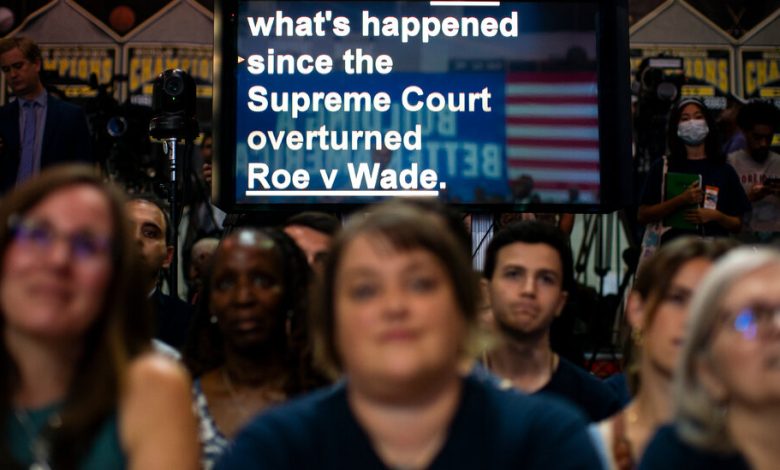Women’s Lives Put at Risk Under State Abortion Bans

To the Editor:
Re “Can Exceptions to a Ban on Abortion Work?,” by Ross Douthat (column, Sept. 15):
Mr. Douthat’s column misses a few key points. The first is that medical emergencies often arise later in pregnancy, when specialized medical skills (maintained through practice) are required to intervene safely. States that ban abortion are likely to have few, if any, providers left with those skills. So some women in those situations will not have access to an abortion, and will die or be permanently injured as a result.
Second, states that ban abortion tend to do so with criminal penalties. It is hard to imagine any other result than what we’re seeing now: doctors too afraid of jail and ruined lives to provide necessary emergency care. This is what we know happens in countries that criminalize abortion (see Ireland, formerly). It’s an even bigger problem in the U.S., with its lawless prosecutors and politicized judicial system.
These two issues are not bugs in the system that can be worked out or wished away to reduce internal conflict, as Mr. Douthat does in his overly theoretical piece.
Alice Clapman
Washington
The writer is a former reproductive rights litigator.
To the Editor:
Ross Douthat’s analogy between assisted suicide and abortion of dangerous pregnancies just doesn’t work. The pregnant person wants to live, not die, and has decided in favor of abortion.
Once again, we see a fetus of whatever gestational age not just competing with but put ahead of an adult human being, in a way that no nonpregnant person is ever expected to sacrifice themselves for another person. Let’s center the profoundly human experience of being pregnant and reject any analogies to it, as they will all be false.
Mr. Douthat’s conclusion is also unsatisfactory. As long as granting such abortions is rare, hard to obtain bureaucratically and essentially shameful, that makes things ethically acceptable? Thus do people buy their own peace of mind at the expense of pregnant people facing a crisis.
Lora Wildenthal
Houston
To the Editor:
Ross Douthat weaves his excellent moral and philosophical argument about protecting the life of a mother needing an abortion but misses out completely on access to care. Clinics have closed because of the new anti-abortion laws, and access to care is also dependent on adequate insurance.
Maternal mortality in the U.S. is already the highest among developed countries — three times worse than Europe and increasing — whereas most other equivalent countries have a declining rate. Sadly this has a greater impact on poor Black and Hispanic women. It is more likely that his potential life-threatened woman will be dead before she even sees a doctor to make the necessary medical and legal decisions.
Stuart Dombey
Ann Arbor, Mich.
To the Editor:
What Ross Douthat does, before a hard-to-follow philosophical treatise bizarrely connecting abortion to end-of-life care and assisted suicide, is to acknowledge that he will blithely skip over the most important question in the abortion debate: When does life begin?
That is a theological question, not a biological one, with answers ranging from the Catholic position that life begins at the moment of conception to an older Christian viewpoint that life begins at quickening, to the Jewish position, based on specific biblical language, that a baby’s life begins with the first breath.
Certainly a just-fertilized human egg is not a fetus, nor is a morula or blastula; a fetus before 24 weeks’ gestation is almost never viable outside the womb.
Mr. Douthat claims to write about “what conflicted Americans might fear most from an abortion ban,” but the overwhelming majority of unconflicted Americans fear the consequences of abortion bans, which will cause irreparable harm to women and families and the economy.
Furthermore, from what Justice Clarence Thomas wrote, abortion bans may be a dangerous harbinger of the imposition of minority positions on contraception, same-sex marriage and interracial marriage, reversing 50 years of progress for our once-great country.
Daniel Fink
Beverly Hills, Calif.
The writer is an internist.
To the Editor:
Long ago and during the many times they had the power to get it done, Democrats could have codified into law a reasonable abortion law. But they have been completely unreasonable in believing that the day would never come when the balance on the court could see Roe upended.
Most Americans, even conservative pro-life Americans like me, would hold our noses, hide our eyes and tolerate abortion early on in pregnancy when the baby is really a cluster of cells. But Democrats can’t be happy with a reasonable restriction that protects unborn humans with a heartbeat, brain waves, eyelashes and fingernails. They are the extremists.
Dwayne Keith
Valrico, Fla.
To the Editor:
Ross Douthat suggests that in cases where there is ambiguity regarding the threat to a woman’s life in her pregnancy, “you can let ambiguous cases pass unprosecuted” when an abortion is being considered.
That suggestion offers no comfort or solution to health care providers. The decision whether or not to prosecute is not theirs. That decision resides within the judgment of a prosecutor, who of course is not a medical professional. A case that to a medical provider falls in a “gray area” might appear very much black and white to a prosecutor. Mr. Douthat’s solution is no solution.
Mark Joy
Brooklyn
The writer is an internist.
To the Editor:
I suppose I should be happy that writers like Ross Douthat are doing some heavy thinking about abortion policy. But I am so, so tired of privileged men thinking so hard about women’s lives, bodies and reproductive organs. So tired and growing so disgusted.
Debra E. Guston
Glen Rock, N.J.
The writer is past president of the Academy of Adoption and Assisted Reproduction Attorneys.
